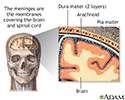Meningitis
Meningitis - bacterial; Meningitis - viral; Meningitis - fungal; Meningitis - vaccine
Meningitis is an infection of the membranes covering the brain and spinal cord. This covering is called the meninges.
Causes
The most common causes of meningitis are viral infections. These infections usually get better without treatment. But, bacterial meningitis infections are very serious. They may result in death or brain damage, even if treated.
Meningitis may also be caused by:
- Chemical irritation
- Drug allergies
- Fungi
- Parasites
- Tumors
Many types of viruses can cause meningitis:
- Enteroviruses: These are viruses that also can cause intestinal illness.
- Herpes viruses: These are the same viruses that can cause cold sores and genital herpes. However, people with cold sores or genital herpes do not have a higher chance of developing herpes meningitis.
- Mumps and HIV viruses.
- West Nile virus: This virus is spread by mosquito bites and is an important cause of viral meningitis in most of the United States.
Symptoms
Enteroviral meningitis occurs more often than bacterial meningitis and is milder. It usually occurs in the late summer and early fall. It most often affects children and adults under age 30. Symptoms may include:
- Headache
- Sensitivity to light (photophobia)
- Slight fever
- Upset stomach and diarrhea
- Fatigue
Bacterial meningitis is an emergency. You will need immediate treatment in a hospital. Symptoms usually come on quickly, and may include:
- Fever and chills
- Mental status changes
- Nausea and vomiting
- Sensitivity to light
- Severe headache
- Stiff neck
Other symptoms that can occur with this disease:
- Agitation
- Bulging fontanelles in babies
- Decreased alertness
- Poor feeding or irritability in children
- Rapid breathing
- Unusual posture, with the head and neck arched backward (opisthotonos)
You cannot tell if you have bacterial or viral meningitis by how you feel. Your health care provider must find out the cause. Go to the hospital emergency department right away if you think you have symptoms of meningitis.
Exams and Tests
Your provider will examine you. This may show:
- Fast heart rate
- Fever
- Mental status changes
- Stiff neck
If the provider thinks you have meningitis, a lumbar puncture (spinal tap) should be done to remove a sample of spinal fluid (cerebrospinal fluid, or CSF) for testing.
Other tests that may be done include:
Treatment
Antibiotics are used to treat bacterial meningitis. Antibiotics do not treat viral meningitis. But antiviral medicine may be given to those with herpes meningitis.
Other treatments will include:
Outlook (Prognosis)
Early diagnosis and treatment of bacterial meningitis is essential to prevent permanent neurological damage. Viral meningitis is usually not serious, and symptoms should disappear within 2 weeks with no lasting complications.
Possible Complications
Without prompt treatment, meningitis may result in the following:
- Brain damage
- Buildup of fluid between the skull and brain (subdural effusion)
- Hearing loss
- Buildup of fluid inside the skull that leads to brain swelling (hydrocephalus)
- Seizures
- Death
When to Contact a Medical Professional
If you think that you or your child has symptoms of meningitis, get emergency medical help immediately. Early treatment is key to a good outcome.
Prevention
Certain vaccines can help prevent some types of bacterial meningitis:
- Haemophilus vaccine (HiB vaccine) given to children helps
- Pneumococcal vaccine is given to children and adults
- Meningococcal vaccine is given to children and adults; some communities hold vaccination campaigns after an outbreak of meningococcal meningitis.
Household members and others in close contact with people who have meningococcal meningitis should receive antibiotics to prevent becoming infected.
References
Hasbun R, Van de Beek D, Brouwer MC, Tunkel AR. Acute meningitis. In: Bennett JE, Dolin R, Blaser MJ, eds. Mandell, Douglas, and Bennett's Principles and Practice of Infectious Diseases. 9th ed. Philadelphia, PA: Elsevier; 2020:chap 87.
Nath A. Meningitis: bacterial, viral, and other. In: Goldman L, Schafer AI, eds. Goldman-Cecil Medicine. 26th ed. Philadelphia, PA: Elsevier; 2020:chap 384.
Brudzinski's sign of meningitis - illustration
Brudzinski's sign of meningitis
illustration
Kernig's sign of meningitis - illustration
Kernig's sign of meningitis
illustration
Lumbar puncture (spinal tap) - illustration
Lumbar puncture (spinal tap)
illustration
Meninges of the brain - illustration
Meninges of the brain
illustration
Meninges of the spine - illustration
Meninges of the spine
illustration
Haemophilus influenza organism - illustration
Haemophilus influenza organism
illustration
Brudzinski's sign of meningitis - illustration
Brudzinski's sign of meningitis
illustration
Kernig's sign of meningitis - illustration
Kernig's sign of meningitis
illustration
Lumbar puncture (spinal tap) - illustration
Lumbar puncture (spinal tap)
illustration
Meninges of the brain - illustration
Meninges of the brain
illustration
Meninges of the spine - illustration
Meninges of the spine
illustration
Haemophilus influenza organism - illustration
Haemophilus influenza organism
illustration
Review Date: 12/24/2020
Reviewed By: Jatin M. Vyas, MD, PhD, Assistant Professor in Medicine, Harvard Medical School; Assistant in Medicine, Division of Infectious Disease, Department of Medicine, Massachusetts General Hospital, Boston, MA.Also reviewed by David Zieve, MD, MHA, Medical Director, Brenda Conaway, Editorial Director, and the A.D.A.M. Editorial team.






















